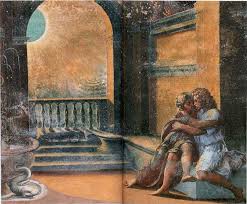Abimelech, King of the Philistines,
Saw Isaac Caressing His Wife Rebekah
26: 6-11
Abimelech, king of the Philistines, saw Isaac caressing his wife Rebekah DIG: Why might this situation be more dangerous for a woman’s husband than for her brother? What does this say about Isaac’s character? His humanity? What kind of a man was Abimelech? How did he react? How did God react?
REFLECT: Isaac repeated his father’s inappropriate behavior. As a “chip off the old block,” we do the same thing. What one “sin” of your parents would you like the LORD to help you eliminate from your own life?
Like his father Abraham, Isaac needed to grow in his walk of faith. This parashah reveals him as displaying some of the same fleshly flaws that his father Abraham displayed. Now there was a famine in the Land – besides the previous famine in Abraham’s time – so Isaac went to Abimelech, king of the Philistines, and stayed in Gerar (26:1 and 6). ADONAI had told him to temporarily stay in Gerar for a while (26:3), but he disobeyed and stayed there for a long time (26:8). As a result, he sinned there. While in Gerar, the people simply and politely inquired about Rebekah. The text does not indicate any menace in their inquiry, but Isaac seems to feel threatened.415 So, like his father, he had a private discussion with his wife and told her, “You tell them that you are my sister, not my wife.” And like Sarah, Rebekah went along with the plan. There was some truth in what Avraham said because Sarah was his half-sister, but there was no truth in what Isaac said. Therefore, when the men of that place asked him about his wife, he said: “She is my sister,” because he was afraid to say, “She is my wife.” He thought, “The men of this place might kill me on account of Rebekah, because she is beautiful” (26:7), so Isaac repeated the sin of Abraham (to see link click Fd – Abraham Said of His Wife: She is My Sister).
The absence of any mention of Jacob and Esau here may suggest that they were back in the Negev looking after the possessions that Isaac (Hebrew: Yitz’chak) couldn’t bring to Gerar. Otherwise, the presence of two grown sons would have made it especially difficult to pass off their mother as his sister.416

Evidently Isaac’s tent was pitched close to Abimelech’s palace. When Isaac had been there a long time Abimelech accidentally stumbled on the truth when he looked down from a window in his palace and saw Isaac caressing, or being amorous with, his wife Rebekah (26:8). Here we have a play upon words. The Hebrew word for caressing and the Hebrew word for the name Yitz’chak come from the same root word. It is the same word used when Ishmael was mocking Isaac (21:9). This phrase can be used in a negative or a positive sense. In the case of Ishmael’s mocking, it was negative, but in the case of Isaac’s caressing, it was positive. Literally, it means Isaac was isaacing his wife Rebekah. However in lying, Isaac was mocking Abimelech. More than that, Yitz’chak had just received the covenant promises of the LORD, but his fear made a mockery of them. Fear mocks faith, where faith laughs in the face of danger.
Like his predecessor before him, Abimelech was a moral man (we must remember that Abimelech was a title like Pharaoh and not a proper name). Understandably upset, Abimelech summoned Isaac and said: She is really your wife! Why did you say, “She is my sister”? The pagan king is here the defender of truth. Is there anything sadder than a child of God being rebuked by a man of the world? At last, Yitz’chak told the truth and answered: Because I thought I might lose my life on account of her (26:9).
Then Abimelech said: What is this you have done to us? One of the men might well have slept with your wife, and you would have brought guilt upon us (26:10). Yitz’chak had missed the point that in attempting to spare his own life, he was risking the lives of everybody else. A whole city was put in danger because one man wanted to escape danger.417 This doesn’t seem to be a very spiritual time for Isaac. Gerar is the only place he went without building an altar.
It is surprising that Abimelech did not take vengeance on Isaac, but instead he gave orders to all the people, “Anyone who molests this man or his wife shall surely be put to death” (26:11). I am sure they had protesters outside the palace the next day! This was a rather severe penalty, even for the Canaanites. For this Abimelech to act in this way he must have remembered the story of the plagues on the house of the former king of Gerar who encountered Abraham some eighty years earlier. In addition, Isaac was a power to be reckoned with, and to curse him meant to be cursed (12:3). Apparently Abimelech’s order did the trick, because later he and his officers said: We did not molest you but always treated you well and sent you away in peace (26:29).
The point here is clear; Yitz’chak made the same mistake as his father Avraham, and yet was delivered by ADONAI the God of mercy, in the same way.418



Leave A Comment